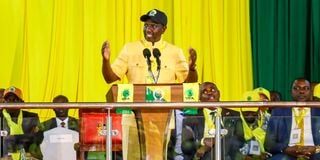Premium
UDA postpones grassroots elections from December to April 2024 after Ruto meeting

President William Ruto addressing delegates during the UDA National Governing Council meeting at the Bomas of Kenya in Nairobi on September 29, 2023.
President William Ruto has postponed his United Democratic Alliance (UDA) party's primary elections, scheduled for December 9, to April next year amid escalating fierce regional power plays and infighting.
A meeting chaired by party leader President Ruto on Saturday morning also decided to stagger the exercise on three different dates instead of holding it on a single day.
Dr Ruto had announced the December 9 date in September during the party's National Governing Council (NGC) meeting at the Bomas of Kenya.
But he was forced to bow to the ensuing power plays, infighting and demands by the National Women's Congress and other party members to postpone the elections.
A meeting of the National Women's Congress at the Bomas of Kenya last month first lifted the lid on behind-the-scenes plans by some top party leaders to push the exercise into next year, even as reports of a party realignment emerged.
One of the resolutions of the meeting, which was presided over by deputy president Rigathi Gachagua, was a recommendation that the planned elections be brought forward.
On Saturday, November 18, the party issued a statement announcing the postponement without giving reasons.
"Following a deliberative meeting of UDA's National Steering Committee chaired by the Party leader, President, William Samoei Ruto, the Party has resolved to postpone the scheduled December 9th elections to 12th, 19th and 26th April 2024 respectively," said a party release.
"All candidates and members of the party are encouraged to continue sensitising and recruiting members of the party," the statement added.
Party elections in the past have been divisive and chaotic, leading to major disagreements, a scenario that has led many outfits in the country to avoid holding party elections.
Most parties have since resorted to consensus and the use of the electoral college to decide on party officials.
An attempt by the Raila Odinga-led ODM party to hold party elections at the Kasarani National Stadium in 2014 was aborted after a group of black-clad youths, infamously known as the 'men in black', stormed the venue and disrupted the exercise.
However, it later emerged that the youths were hired by some senior party officials to fend off what they claimed was an attempt by some external forces to take over the party by planting their proxies in key party positions.
Since then, ODM has shunned the use of delegates to conduct party elections, instead opting for a non-adversarial electoral process.
In 2021, the party engaged in county-by-county consensus-building to select party officials, culminating in a National Governing Council (NGC) in Nairobi.
In Jubilee, Mr Kenyatta refused to call for party elections, although his then deputy kept up pressure on party members to participate in the selection of officials.
The outfit, formed in the run-up to the 2017 general election, installed interim officials with plans to hold elections within three years.
"All interim party officials shall serve for a period not exceeding three years from the date of their appointment unless they are elected in accordance with this constitution," the party's constitution reads.
But Mr Kenyatta refused to call the elections after it emerged that Dr Ruto was plotting a takeover of the party in preparation for his 2022 presidential bid.
This was followed by a purge that saw allies of Dr Ruto purged from key decision-making bodies such as the National Executive Council (NEC) and the Central Management Committee.
Mr Kenyatta later held the party's National Delegates' Conference (NDC) after ousting President Ruto's sympathisers, where his allies were installed in key party positions including Jeremiah Kioni who was picked to replace Raphael Tuju as the party's secretary general.





